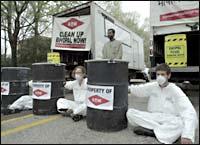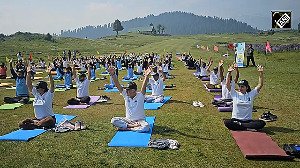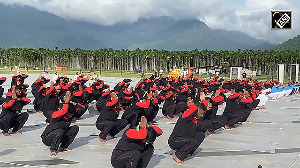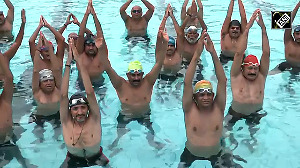Greenpeace's trademark flamboyance in bringing issues to notice was on show at Houston, Texas, Tuesday as it joined hands with the International Campaign for Justice in Bhopal to plonk down 250 gallons of toxic water in front of the gates of the Houston Dow Center on Sam Houston Parkway South.
Two trucks carrying barrels of toxic drinking water from Bhopal were placed in front of the gates even as activists chained themselves to concrete filled barrels. "Police had to break the concrete with drills and hammers," said G Krishnaveni, US coordinator for the ICJB.
Houston police arrested 12 activists. The Texas Environmental Crimes unit was in the process of testing the water for toxicity when reports last came in. If it is found in violation of toxic levels permitted in the US, the ICJB and Greenpeace activists could face charges.

"It is ironic that they should be doing this, considering this is standard drinking water for so many people around the Union Carbide area," Krishnaveni told rediff.com.
The ICJB is a coalition of social groups that has been fighting for justice for the victims of the 1984 Bhopal gas disaster - in which a methyl isocyanate leak from the Union Carbide plant affected about half a million people and killed about 8,000 - for the past 18 years. Two years ago, they were joined in their efforts by Greenpeace.
Union Carbide is now fully owned by Dow Chemicals.
The action in Houston started at about 11:30 am and continued for five-and-a-half hours. "It was mainly the concrete blocks that prevented the police from removing us sooner," Krishnaveni said. She would not reveal what the ICJB and Greenpeace plan to do to follow up this action.
The activists apparently took advantage of loopholes in the import of liquids into the US to get the toxic water in. "If it's solid toxic waste, the controls are much stricter, it's a felony but there are some ways out when it comes to water which we used," Krishnaveni said.
The protesters demanded that Dow meet with Bhopal survivors and drop two lawsuits it has filed against survivors who held non-violent demonstrations outside Dow's Mumbai, India office.
John Musser at Dow's corporate headquarters in Michigan reportedly told a Greenpeace campaigner that Dow would meet with survivors at or before the company's annual general meeting in May.
However, he is believed to have made it clear that there would be no discussion of liability isssues or other matters. He reportedly also said that the lawsuits against the survivors would not be dropped.
The ICJB has been pressing for the extradition of Warren Anderson, then chairman of Union Carbide and who is now retired and lives in the Hamptons on Long Island.
Anderson, along with other UC officials, faces charges of 'culpable homicide', an extraditable offence since 1989. The charges are in the process of being transferred to Dow Chemicals.
Image : Greenpeace, USA





